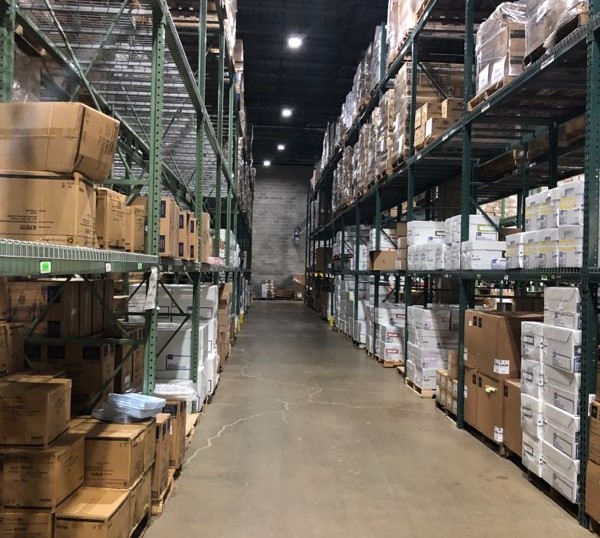Growing together: How a healthcare system, an insurer and a broker partnered on resilience

Frederick County is the fastest-growing county in Maryland, rising in population by about 50% in the past two-and-half decades. As the area transformed, so, too, has one of its most vital institutions: Frederick Health, which includes a hospital in the county seat and a network of other medical facilities.
In 2019, to accommodate this rapid growth, Frederick Health bought a 90-acre campus previously used by a large corporation in the city of Frederick. In addition to the 400,000 square feet of elbow room for office space and outpatient services, the campus had a warehouse. Moving to the new warehouse would mean Frederick Health would retire its old one, which was vulnerable to flood and was the highest-risk property in the portfolio.
There was, however, a problem with the new warehouse. A US$90 million problem. It soon became apparent when Frederick Health’s insurer, FM Affiliated, visited the site to assess it: the sprinkler system.
The warehouse had previously stored paper products. The sprinklers were adequate to protect a warehouse full of paper. But Frederick Health was going to store, in addition to paper, things like medical images and supplies. In technical terms, some of these materials were “cartoned unexpanded plastics.” In practical terms, they posed a bigger fire risk than paper.
And the sprinklers weren’t up to the task.
“Plastic is a petroleum-based product,” explained Chris Braden, FM Affiliated senior production underwriter and the account manager for Frederick Health. “When plastic burns, it initially melts into a liquid state before breaking down even further into various forms of gases. And not only does that liquid spread, it generates tremendous amount of energy. Now, just visualize the significant increase in the exposure when we went from protecting paper, to protecting petroleum in the form of plastic.”
That made the warehouse vulnerable. It made the hospital’s data center vulnerable. It made the medical equipment vulnerable. It made the whole system vulnerable. And in a way, because the community relies on the system, it made the community vulnerable.
To Frederick Health, that wasn’t an acceptable risk.
“The bottom line is we’re here to take care of our patients,” said Kristen Fletcher, Vice President, Compliance & Risk, Chief Compliance Officer for Frederick Health. “We need to make sure the day-to-day operations are functioning.”
So Frederick Health took action, undertaking a project to upgrade the sprinkler system in the warehouse. The partnership brought together insurer, broker and client, working together during the thick of the COVID-19 pandemic to eliminate a loss expectancy estimated at between US$60 million to US$90 million.
With it, Frederick Health got a stronger sprinkler system and the peace of mind knowing that by being proactive, a key part of a growing system was protected.
The sprinkler upgrade underscores the importance of resilience across a company’s portfolio of properties – even the less glamorous ones. The patient care areas might be the first thing you think about when you think about a hospital system, but the warehouse is just as vital.
“Our warehouse – that’s our inventory, that’s the supplies we have to take care of our patients,” Fletcher said. “We need to protect that. Especially during times like COVID – our inventory was critical.”
Though the upgraded sprinkler system was a significant investment, there’s nothing all that complicated about why it was better once the project was completed: It could dump more water, with more pressure, over a potential fire. Fortunately, Frederick Health hasn’t had to contend with any fire-related issues at the warehouse.

An image of the inside of Frederick Health Village’s warehouse. (Courtesy Frederick Health.)
FM Affiliated is part of the FM Group, which has been at the forefront of sprinkler protection since the 1800s. It remains at the forefront in the 21st century. At its research campus in West Glocester, Rhode Island, FM conducts burn experiments to show how different commodities react to fire. From there, it develops recommendations about an appropriate sprinkler system depending on what the system is protecting.
FM Affiliated’s representatives showed those videos to Frederick Health when explaining why the sprinkler upgrades were necessary.
“You can explain it, and they can understand it, but the intensity is much more when you’re seeing it on video,” said Kidus Yared, FM Affiliated’s account engineer for Frederick Health. “It tells the client that the numbers we’re coming up with for sprinkler system design are from empirical testing that we’re doing. You just can’t go wrong with that.”
Frederick Health was on board with the recommendation.
“It’s coming on good authority,” says Billy Demory, Director, Facilities Management, for Frederick Health. “And it’s sensible, given what we’re doing.”
It wasn’t a hard sell, especially because the broker team – led by Ray Ramsburg of McGriff – was also aligned with FM Affiliated’s recommendation. FM Affiliated’s broker partner took the time to understand the issues, and their goals are the same – to help their mutual client, Frederick Health, Braden said.
“That, to me, is the ultimate broker,” Braden said.
The location today is up and running, and it plays a vital role in the health care system’s portfolio. Newly outfitted with upgraded warehouse sprinklers, it now has a new name: Frederick Health Village.
The warehouse sprinkler protection was just one of the steps Frederick Health had to consider as it put together its village,” Demory says. “For example, while sprinklers are vital in many areas, in others, a discharge could mean soaking (and ruining) millions of dollars’ worth of diagnostic imaging equipment elsewhere. FM Affiliated was there as a resource as Frederick Health weighed options like pre-action systems and dry chemical suppression for specialty areas,” Demory said.
“I feel the relationship we have with FM Affiliated is healthy and collaborative,” said Demory. “We were well advised to make those changes. We’ve done them, we’ve implemented them, and we haven’t looked back.”
